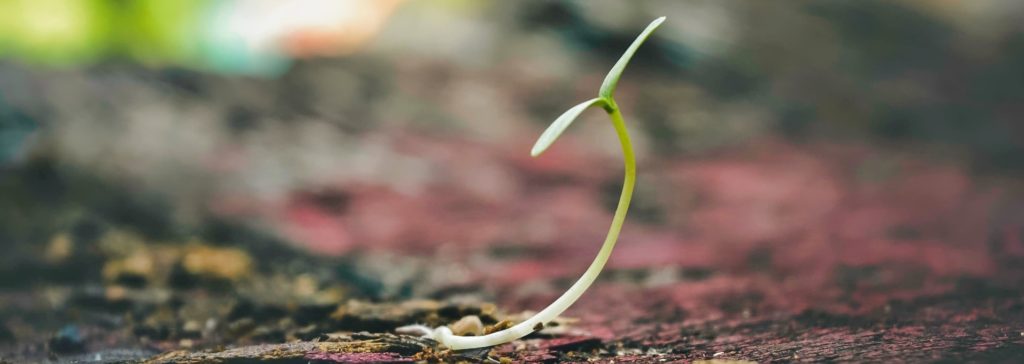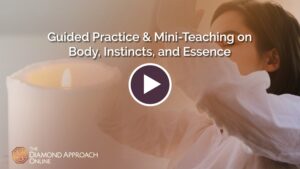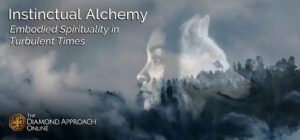I’ve Got Your Back: The Holding Environment and Basic Trust
Depending on your particular history, and how safe and supported you feel with different people, you probably have varying degrees of trust in others.
This interpersonal situation that we all experience also reflects a more universal one. How much do you trust in life and in the universe itself?

This type of fundamental trust is different from relational trust. In the Diamond Approach it’s called basic trust, and it turns out to be extremely consequential for our lives.
The Holding Environment
Basic trust closely relates to something that psychologists call the holding environment:
The situation in childhood that contributes to the sense of basic trust is what is referred to in the psychological literature as the “holding environment.” The person most responsible for this concept of holding is D.W. Winnicott, an important figure in the British object relations school. What he calls the holding environment is the environment during the first year or so of life, the period of infancy before the child begins to develop a separate sense of self. Initially, the environment is the womb; later on it is the arms that held you, mother’s lap, perhaps father and other people, the environment of your crib, your bedroom, your house—the whole situation. So “holding environment” here means the totality of the surroundings and the general feel of it through the formative years. Mother is central to this environment but it isn’t limited to her. – A. H. Almaas, Facets of Unity, Chapter 6
With a solid holding environment, basic trust shows up in us naturally as an unquestioned, innate, and pre-verbal confidence in reality. But because no one has a perfect holding environment, our basic trust and our natural growth become limited.

The child can experience the environment as more or less holding. If the environment is a good holding environment, it makes you feel taken care of, protected, understood, loved, and held in such a way that your consciousness—which at the beginning is unformed, fluid, and changeable—can grow spontaneously and naturally on its own. The soul in this respect is like a seedling. A seedling needs a particular holding environment in order to develop into a tree: the right soil, enough water, the right nutrients, the right amounts of light and shade. If it doesn’t have the proper holding environment, it won’t grow steadily and healthily, and it might not grow at all. – A. H. Almaas, Facets of Unity, Chapter 6
In the face of the loss of the holding environment, our basic trust in the universe disappears.
Without it we start trying to make things happen on our own; we reject what’s happening right now and go instead with our own “individual will.” We might feel afraid, tense, reactive, distrustful, or even paranoid, and we act from these egoic states.
Connect with the Benevolence of the Universe
But there’s something we can do to connect more with the fundamental benevolence of the universe.
You practice [basic trust] by staying with what is there, by not going along with the usual tendency to reject what is there and try to get something else… Instead of trying to get satisfaction, fulfillment, happiness, love, we allow ourselves to have basic trust. Then all that we do, our relationships and all our activities, are an expression of the satisfaction, fulfillment, and love. The true life is a spontaneous activity that arises out of our essence, and there is no need for the efforting kind of will. You’ve got everything. You simply need to see the truth, and what needs to happen just happens. You don’t need to do anything about it. The functioning of true will causes you to do what is needed: if you need to go buy something from the store, or to talk with someone about something, the impulse will come spontaneously. You don’t need to ruminate about it. All of you have had such experiences, when everything flows spontaneously. You just do what’s right. As adult human beings, we actually have the capacity always to do what is right, for ourselves and for everyone else. – A.H. Almaas, Diamond Heart Book Two, Chapter 8
Deciding to work with a spiritual teacher—inquiring honestly into the blocks we have to trusting, to relaxing, and to being with our truth as our authentic selves—can help us to unfold our potential to have confidence in our essential self, to trust reality, and to do what is right for ourselves and others.
“The teacher’s lack of interest in reaching [a particular outcome] reflects his basic trust in the natural unfolding of the soul when one aligns with its truth. This law of movement in the human soul and the teacher’s trust in it are both fundamental to the practice of inquiry in the Diamond Approach. Inquiry is not an activity aimed at bringing one to a particular state or capacity. Nor is it a means of discovering what stops one from arriving at a certain outcome. Inquiry is a means of inviting our true nature—which has much greater intelligence and awareness than our conscious mind will ever have—to reveal itself and guide us to a deeper understanding of reality and our own truth. True inquiry does not assume that one outcome, one experience, or one feeling state is better than any other at any given time. Inquiry invites whatever is here to show itself and reveal its truth. And each revelation, if allowed and held with respect and interest, will lead to understanding and revelation—and the further unfoldment of the soul. – A. H. Almaas, Brilliancy, Chapter 5

And as we develop basic trust and start to relax into the true holding that Being is always providing, we transform and optimize our lives from the inside out.
Learning a sense of basic trust is like learning to swim. At first we may have fear and anxiety, we may flail around for months, but with time, our skill and confidence grow to the point where we can roll onto our back and just float in the water. Have you noticed how when you float on your back, there is confidence, there is knowing, there is relaxation – and everything is just fine?
We can only have basic trust when we are feeling this loving holding of the universe.

Open Window: Teaching and Practice
We have been hearing from people in our global community how much the tumultuous international events of this time are impacting them. So again this month we are sharing a teaching excerpt and practice from the Spirituality in a Fractured World course that you can

Fractured Unity: Teaching and Practice
To support our global community, we want to share a teaching excerpt and practice from the Spirituality in a Fractured World course that you can do at home today. Past participants in the SFW course have said the teachings and related exercises had a tremendous
Sanctuary in the Storm
https://vimeo.com/1051651200 Enjoy this free video recording of our January 26, 2025 webinar with Diamond Approach founders A. H. Almaas (pen name of Hameed Ali) and Karen Johnson to explore how we can deepen our inner stability, stay rooted in realization, and bring beauty to stormy
2024: A Year of Harmonizing Our Animal and Spiritual Nature
This year’s theme of exploration was designed to meet us exactly where we are – amidst the very human challenges we face every day. Escalating conflict, an epidemic of disconnection, global instability – everywhere we look we see the unconscious expression of our primal animal instincts playing out

Embodying the Love of Truth
What does it mean for this life in a human body to be all that it can be—for the truth of our inner nature to come forward and be how we live? We each have a unique relationship with our body that includes both

Instinctual Alchemy
https://vimeo.com/1013218117/2104c40e8f?ts=0&share=copy Enjoy this free video recording of our September 22, 2024 webinar with Diamond Approach teachers Linda Krier and Jessica Britt for a critical, timely, and new teaching on the powerful synergy between body, instincts, and spirituality that allows us to be more authentically available
